In his latest excerpt from the full Weekly Dish, Andrew Sullivan reviews a new book from James Kirchick, Secret City: The Hidden History of Gay Washington, including a fascinating character I’d never heard of until now, a woman who ranked with Al Capone as an underworld boss during Prohibition:
Odessa Madre grew up in a section of Washington DC called Cowtown, because farm animals would occasionally wander its streets. Born in 1907 in abject poverty, she nonetheless lived and thrived in a deeply segregated city as a dark-skinned African-American woman. “There was only three Blacks at Dunbar (High School) back then — I mean Black like me,” she later recalled. “I had good diction, I knew the gestures, but they still made fun of me.” Dess, as many called her, was also a lesbian, and not too shy about it. “I just couldn’t keep no watchamacallit — a man. I guess I was just born to give orders not take them. What kind of man wants a woman like that?”
She went on to become one of the wealthiest African Americans in an overwhelmingly black city — hauling in over $100,000 a year at her peak — by becoming “the female Al Capone”. She ran brothels, pimped women, owned speakeasies, as well as owning a legit and legendary institution on 14th Street, Club Madre. Jamie Kirchick conjures up a scene from the 1940s:
The crowd roared its approval whenever Madre, covered in mink furs and diamonds and trailed by a multiracial retinue of women for sale, entered the premises and sauntered over to the central table, denoted as hers by an ever-present vase holding a dozen long-stemmed roses.
Among the performers at the club: Billie Holiday, Duke Ellington and Count Basie. Madre kept all her illicit businesses alive by the old-fashioned method of bribing the fathomlessly corrupt DC police — “You know I practically ran that damn police department,” she later quipped — and became a renowned mediator of mob disputes across the country.
She also reflects a pattern that occurs throughout Kirchick’s new book, Secret City: The Hidden History of Gay Washington. She is within a core group of lesbians and gay men somehow living their best lives in the mid-20th Century, simultaneously at the center and the periphery of power. They were capable, whip-smart and hard-working, resilient beyond measure, yet never free from the threat of being taken down by the criminal law, exposure, blackmail, violence, public shaming and utter ostracism. Madre was convicted in 1949 on various drug offenses, spent over 13 years in prison on one charge or other, and died in 1990, without a penny to her name. Her corpse stayed in the morgue for a week until someone claimed it.
The same terrible story could be told of countless others. They were powerful until they were powerless. They lived on probation their entire lives.
One of several wonderful things about Kirchick’s book is that it doesn’t condescend to these people, but seeks to understand them on their own terms. It shows the tenacity, nerve, and brilliance of a woman like Madre — as well as her immiseration. It brings to crackling life the many gay men and lesbians who were under persecution so brutal and terrifying it is hard for anyone today to appreciate — and yet they lived, worked, loved and often succeeded. Some details (from the magazine, Washington Confidential) leap out:
Today one can only marvel at the courage demonstrated by the “1700 Negro men, all dressed as women, who held a party on a Potomac River cruise incongruously named the Robert E Lee until it was rudely interrupted ben one hundred police officers.
It’s a rare book about gay people that isn’t burdened by the constrictive dogma of “queer theory” and “intersectionality”, free of the nonsense that the gay rights movement began in 1969. The book treats gay people as complex human beings, not socially constructed victims; and it is unafraid to note how gay men were for long by far the principal targets of American persecution.




